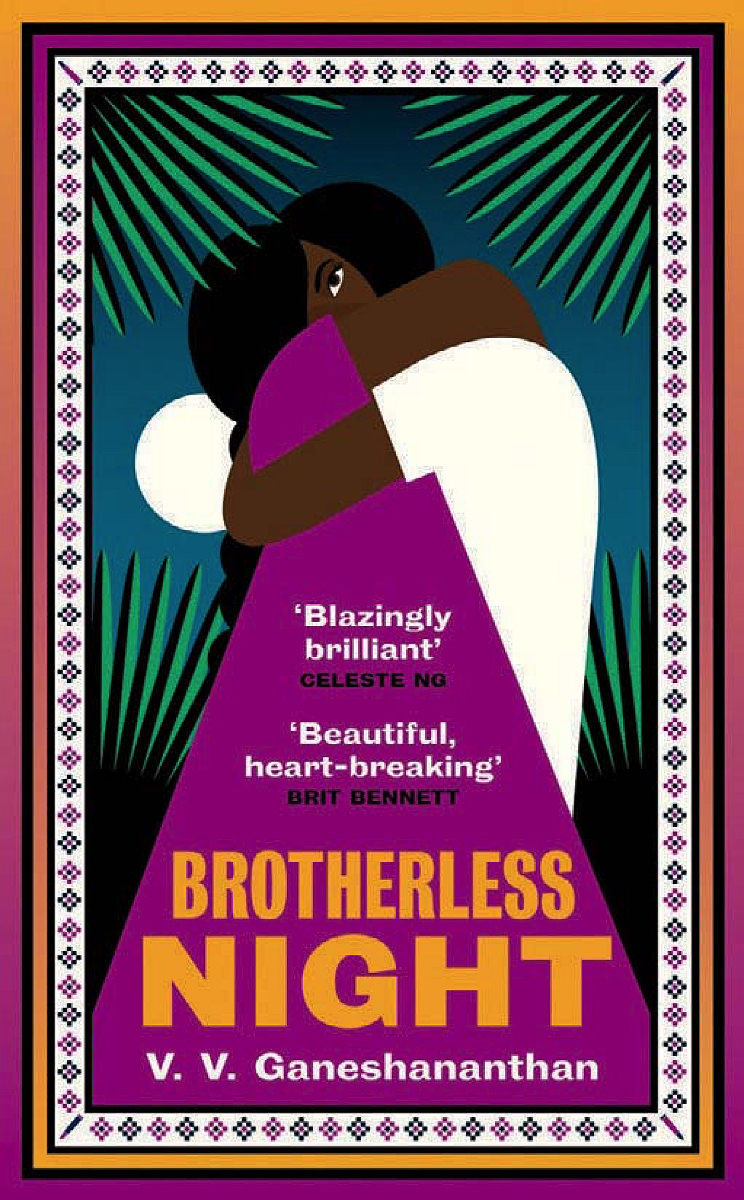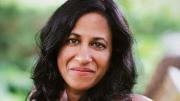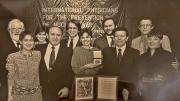When V.V. Ganeshananthan’s first novel, Love Marriage, came out in the early spring of 2008, Sri Lanka’s decades-long civil war—the conflict at the heart of the book’s plot—seemed to have ossified into something interminable. “I think my earliest memories are probably of hearing about the war, or being aware of it,” she explains. “And I hadn’t really thought of it as something that would end.”
A little more than a year later, however, the war did just that. Its conclusion helped shape the complex process of drafting her second novel, Brotherless Night, published this January, even though the plot largely focuses on the war’s first decade. (The protagonist, Sashi, is a young medical student who finds herself gradually drawn into the conflict.) While acknowledging that “for many people the war’s end, in particular, is a site of significant trauma,” Ganeshananthan ’02 returned to the conflict’s early years in the 1980s, which coincided with the earliest years of her life.

She started Love Marriage as her senior thesis and continued working on it while pursuing her M.F.A. at the University of Iowa. By the time it was published, she had also received a master’s in journalism from Columbia University. But she had already started Brotherless Night in early 2004; in fact, it was during the research for Love Marriage that she stumbled across the anecdote around which the new novel would coalesce: a hunger strike by a young Tiger operative, a member of the Tamil militant organization fighting the Sri Lankan government.
Ganeshananthan, whose parents came to the United States in the 1970s, has worked to disentangle the ambivalent feelings native Sri Lankans and members of the diaspora have about the brutal conflict between the dominant Sinhalese and the minority Tamil population in the northeastern portion of the island. The war began in 1983 as an insurgency against the government by Tamil Tiger militants, who sought an independent state. By the time the Sri Lankan military defeated the Tigers in 2009, between 80,000 to 100,000 people had died, according to United Nations estimates. There were reports of numerous atrocities: the government was accused of bombings against civilian targets, abductions, rapes, and massacres of Tamil civilians. The Tigers became known for suicide bombings, assassinations, and using child soldiers.
Stories from the war recur across Ganeshananthan’s novels and serve as flashpoints of debate; one involves a Jaffna teacher, based on a historical figure, who was assassinated by the Tigers for organizing a cricket match. “That was a story I knew from a very young age,” she says, “even as I knew many people who were sympathetic to the Tigers and were strong supporters of them.”
Born in Connecticut, Ganeshananthan grew up in Bethesda, Maryland, where her family had moved for her father’s work. (He was a physician; her mother worked at a Montessori.) A voracious reader and writer, she remembers hearing her parents, relatives, and family friends tell many of the stories that would later appear in her fiction. When Ganeshananthan’s aunt emigrated to Maryland with her own family in the early 1990s, something shifted in Ganeshananthan’s awareness of the war. Her cousin, who was close in age and from Sri Lanka’s Eastern Province, brought new perspectives. “She had been there and had a very clear sense of the politics because she had been in them,” Ganeshananthan says. “And I had just been hearing kind of entrenched diaspora stories about them.”
Still, she notes, “I didn’t write about Sri Lanka, really, until I was in college.” Ganeshananthan threw herself “obsessively” into writing for The Harvard Crimson, where she became managing editor. She took workshops and an independent study with Jamaica Kincaid, “an extraordinary teacher.” Though there was never any pressure in those courses to write from a particular viewpoint, Ganeshananthan felt herself naturally drifting toward the subject of the diaspora.
She is sympathetic to arguments about the inauthenticity of writing from outside a country, but refuses to accept their implications. “I don’t disagree that there are issues of appropriation,” she explains, “but I’m also concerned about a world that considers others unapproachable, or impenetrable, or inscrutable.” Partly this is an inheritance of her reporting background: “As a journalist, you’re writing about other people, and you have to believe that’s possible and okay.”
Brotherless Night can feel like a hybrid, delicately balancing the requirements of fiction—plot, characterization—with those of historical documentation. Ganeshananthan plumbed several universities’ libraries and archives (including Harvard’s) and conducted numerous interviews with people who’d lived through Sri Lanka’s civil war. “I was pretty omnivorous in what I was willing to look at and who I was willing to talk to,” she says. Her primary sources included memoirs, many with a partisan bent. “A huge part of the research process was having to cross-reference interviews I had done and conversations I’d had with what was written—and what was written against other things that were written.”
And while the novel benefited from the work of journalists, both American and Sri Lankan, she values the freedom of fiction. “The processes of verification are there, but they’re not codified in the way that they are for journalism,” she says. This openness allows space for what she describes as “community knowledge”: passed-down stories that remain unverifiable, even if their veracity isn’t in doubt. “I think that anyone who went through the war…or even who has family that did, knows some things that were not documented in the traditional ways,” she explains. “Fiction was a space to get some of those things down onto the page.”
The desire to expand the scope of stories told about the war is woven into the novel in another way as well: Brotherless Night is intentionally feminist, with narratives beyond the countless memoirs of combatants Ganeshananthan found in her archival research. “I wasn’t encountering the memoir of, say, the auntie who lived on Second Chapel Lane in Colombo, who packed up her family six times and fed them on lentils and one coconut for three weeks while they took refuge in a temple,” she says. But when she was interviewing subjects for research, “Those were a lot of the stories I heard.”
In the novel, as Sashi navigates the conflict, she goes through a process of research and political education that mirrors Ganeshananthan’s. “To be a person who is willing to critique multiple actors, including myself, was an important set of choices while writing the book,” she says. “And I thought it might be an important set of choices for Sashi as well, because there are plenty of people who went through that time period who were heavily politicized by what happened to their classmates, or their friends, or their families.”
Ganeshananthan’s examination of storytelling also goes beyond her own writing. Besides teaching fiction and nonfiction writing in the University of Minnesota’s M.F.A. program, where she’s an associate professor, she also co-hosts a weekly podcast from LitHub called “fiction/non/fiction,” which concentrates on the intersection of literature and politics. “It’s been really fun and useful for me to talk to journalists about their craft and the particular writing problems they have to solve,” she says. “It’s a way for me to sort of subconsciously work out problems related to fiction, by talking about them in this different genre.”









